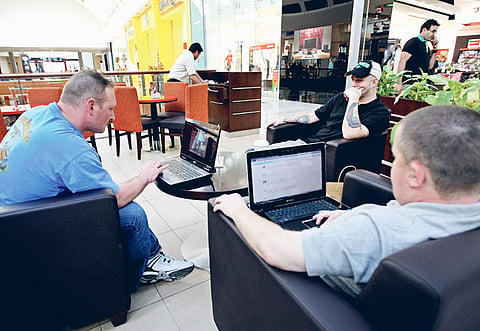Four companies to get VoIP in the UAE
Telecommunication Regulatory Authority urges foreign players to partner with local firms

Abu Dhabi: A government regulator Monday said that only four licensed UAE telecom operators had permission to offer voice over internet protocol services (VoIP) in the country.
Mohammad Geyath, executive director of the Telecommunications Regulatory Authority (TRA), told reporters yesterday at a press conference that there would be no addition to the number of players offering VoIP services.
He added that there would be no changes to government policy regarding this issue.
"When we announced our VoIP policy [in 2006], we did not look at VoIP outside the framework that was existing," Geyath said.
"We certainly will not do that now or in the future."
TRA has been blocking various VoIP service providers.
Geyath said TRA considers VoIP a service which has to be licensed and regulated. He said that was the reason the TRA allowed telecom operators to block access to service providers such as Skype.
"For the time being, we don't have licensing for those companies [international VoIP service providers not licensed by the TRA], but they are more than welcome to come in and establish partnerships with local companies."
Etisalat rollout
Etisalat yesterday said it was ready to instal, manage and maintain the telephone networks of businesses including VoIP services, in what it said was "the first phase of its overall strategy to offer VoIP-based services."
The company's rival, du, and satellite service providers Yahsat and Thuraya have yet to announce their VoIP plans.
VoIP telephony allows users to make phone and video calls and send text messages to mobiles and land-lines using the internet for free or at costs well below those charged by traditional network operators.
The trade-off for the discounted or free services includes lower connection quality and less security, although companies such as Skype have won consumer praise in the West for offering high quality voice calls for as little as $0.02 (Dh0.07) per minute.
The UAE first introduced VoIP regulation in 2006, banning the use of the service except for national calls, thereby allowing du and etisalat to route their mobile and landline calls over the internet.
Etisalat has since worked to make the conversion while du has operated from its beginning on an all-IP network.
In December, the regulator said it would allow the two companies to offer VoIP services and exempted academic institutions and government departments from the ban on using non-licensed VoIP services.
Despite the framing of VoIP as a regulatory and consumer protection issue by regulators, analysts say Gulf Cooperation Council countries ban the use of VoIP to protect their telecom operators as expatriates make up significant portions of their respective populations.
Sulaiman Aboul Hosn, a telecom analyst for Prime Emirates, said VoIP deregulation in UAE would be slow.
"I think it will be done in a controlled fashion so as not to destroy such revenue streams of etisalat and du," Aboul Hosn said.
"Around 75 per cent of the UAE's population is made up of expatriates and a significant portion of telecom revenues is derived from international calls."
Last week, Skype chief executive officer called the UAE's policy of banning his company's services to locals "short-sighted" but said both parties are negotiating a possible partnership to provide VoIP services through local operators.



